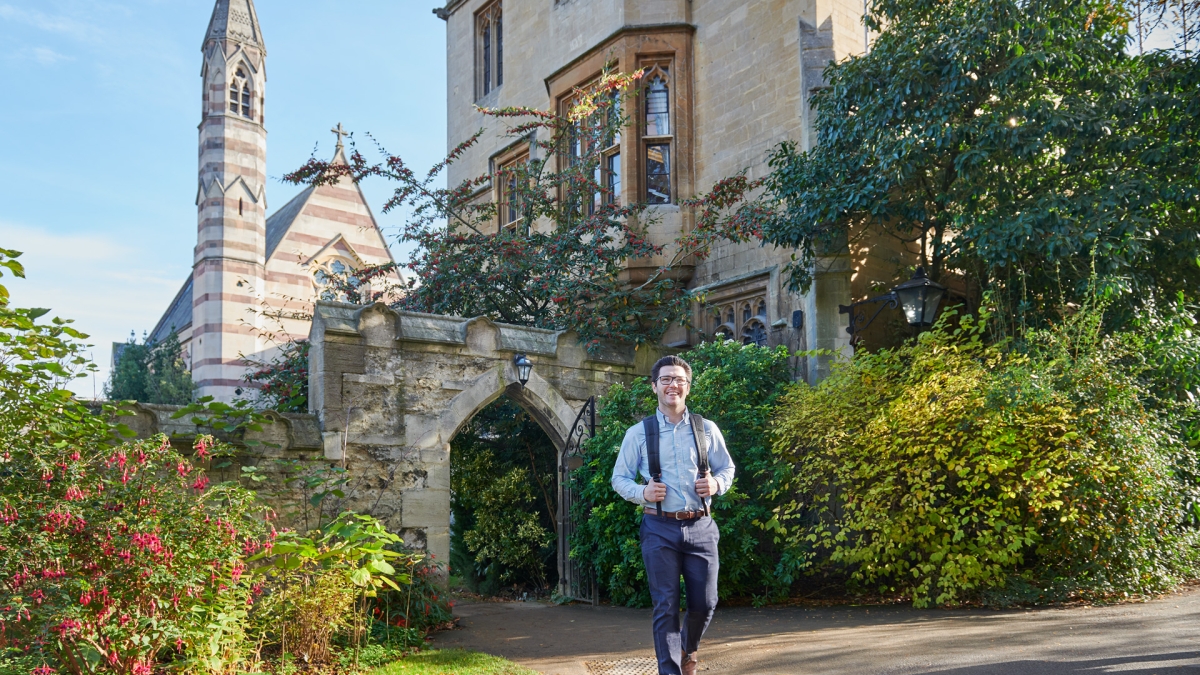Frank Smith III arrived at Arizona State University knowing what he planned to be when he grew up.
“I joke with my friends that I wanted to be the next Ryan Seacrest,” says Smith, a Mesa, Arizona, native who was initially drawn to ASU’s Walter Cronkite School of Journalism and Mass Communication.
That changed several months later, and so did the trajectory of Smith’s academic career.
A discussion with fellow students during Smith’s freshman year led to him testifying on behalf of an Arizona state bill to abolish tuition fees for former foster children. The bill passed, and the experience flipped a switch.
“When I had the opportunity to go down to the state Legislature, I saw that I enjoyed being in the policy discussions and really being a part of the change, as opposed to being on the outside,” Smith says. “I really wanted to be on the inside, where the action was.”
Now, public service is his passion, and it has taken the 2018 ASU graduate to the University of Oxford in England, where he is a Marshall Scholar studying for a Master of Philosophy degree in comparative social policy.
“It’s about doing everything I can to make my community better,” Smith says. “What’s going to improve the outcomes of the most disadvantaged members of society, and what can I do to help them out? It’s about putting the needs of the community above my own. How can I be a tool of change?”

Frank Smith III credits friends and mentors for helping him succeed and "start giving back to the community that has given so much to me." Photo by Aaron Kotowski
The answer to those questions could be by making something factual of the fiction that was Frank Capra’s classic 1939 movie “Mr. Smith Goes To Washington,” starring Jimmy Stewart as a newly appointed U.S. senator who works tirelessly against corruption.
“A few professors from undergrad mentioned that before my internship in D.C.,” Smith says. “And even more people started saying that to me when I said I wanted to have a career on the Hill.”
Leaving behind ambitions of becoming a TV star, the real Mr. Smith went to Washington in 2016 as an intern on Capitol Hill in the education office of Sen. Patty Murray (D-Wash.) and worked with the Senate Committee on Health, Education, Labor and Pensions.
He also traveled to Mexico and Ghana for research and volunteer trips. He then paused for a semester to work on Hillary Clinton’s 2016 presidential campaign team in Michigan. When that finished, he returned to Arizona to work on David Garcia’s 2018 race for governor.
Smith has a plan for going back to Washington.
“I’d like to take what I learn back to Capitol Hill,” he says, “try to work my way up to be a senior policy adviser or a chief of staff in some way that I can utilize the knowledge that I’m gaining and to be an advocate of foster care reform.”
A foster child himself, Smith didn’t lack for motivation to take up his cause. By the age of 17 he had lived in 27 foster homes.
“Stability was definitely not part of my childhood,” Smith says. “Honestly, life was hard growing up. I spent most of my adolescence in extreme poverty, which typically results in untapped potential, a lifetime of closed doors and often insurmountable obstacles. Through the support of social services, scholarships, mentors and a considerable amount of determination, I have been able to start giving back to the community that has given so much to me.”
But far from a handicap, he sees his experience as the fuel for his fire in beating incredible odds — only 10% of former foster children reach university, and just 3% graduate. “Because of my upbringing, there’s one more advocate for foster care reform,” he says. “It’s really unlocked some of my potential.”
ASU provided scholarship support to help Smith unlock that potential. He entered the university as an Armstrong Scholar, an Obama Scholar, a Spirit of Service Scholar and a Nina Mason Pulliam Scholar. His help in passing Arizona’s Foster Care Tuition Waiver earned him the Truman and Marshall scholarships, the capstone of an accomplished academic career.
In his sophomore year, Smith was elected the youngest student body president ever at the ASU Downtown Phoenix campus, and he was reelected for a second term. After focusing on public service in his studies, he graduated in 2018 with two bachelor’s degrees — in political science and public service/public policy with a concentration in business.
Now, Smith is expanding his worldview at Oxford, having learned that public policy shouldn’t be confined to border lines drawn on maps.
“What’s really interesting about the (philosophy) program is that it takes an international perspective to issues that are traditionally seen as domestic policies — health care, education, pensions, labor market policies,” Smith says. “It tries to look beyond the borders of one nation.”
Smith also wants people to look beyond negative stereotypes associated with the foster care system.
“When people hear about foster care, they think, ‘Oh, this child was a delinquent. They got involved with the criminal justice system,’” he says. “My past has not only instilled a sense of compassion and empathy within me at an early age, but has given me a firsthand view of the inequalities in America, which I would like to spend the rest of my life improving through a career in public service.”
Written by Telford Vice, a London-based journalist who has written for ESPN websites, Reuters News Agency and the Guardian newspaper, and also has broadcast for the BBC. Top photo by Darren Rees. This article originally appeared in the summer 2019 issue of ASU Thrive magazine.
More Law, journalism and politics

ASU Law to honor Africa’s first elected female head of state with 2025 O’Connor Justice Prize
Nobel Peace Prize laureate Ellen Johnson Sirleaf, the first democratically elected female head of state in Africa, has been named the 10th recipient of the O’Connor Justice Prize.The award,…

Native Vote works to ensure the right to vote for Arizona's Native Americans
The Navajo Nation is in a remote area of northeastern Arizona, far away from the hustle of urban life. The 27,400-acre reservation is home to the Canyon de Chelly National Monument and…

New report documents Latinos’ critical roles in AI
According to a new report that traces the important role Latinos are playing in the growth of artificial intelligence technology across the country, Latinos are early adopters of AI.The 2024 Latino…
